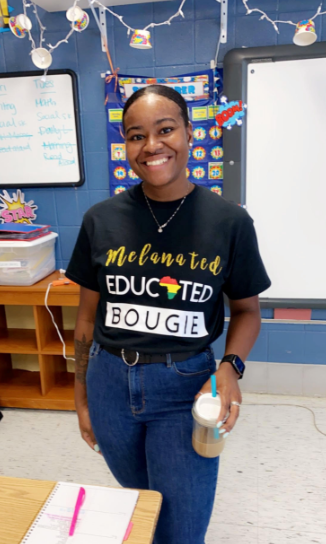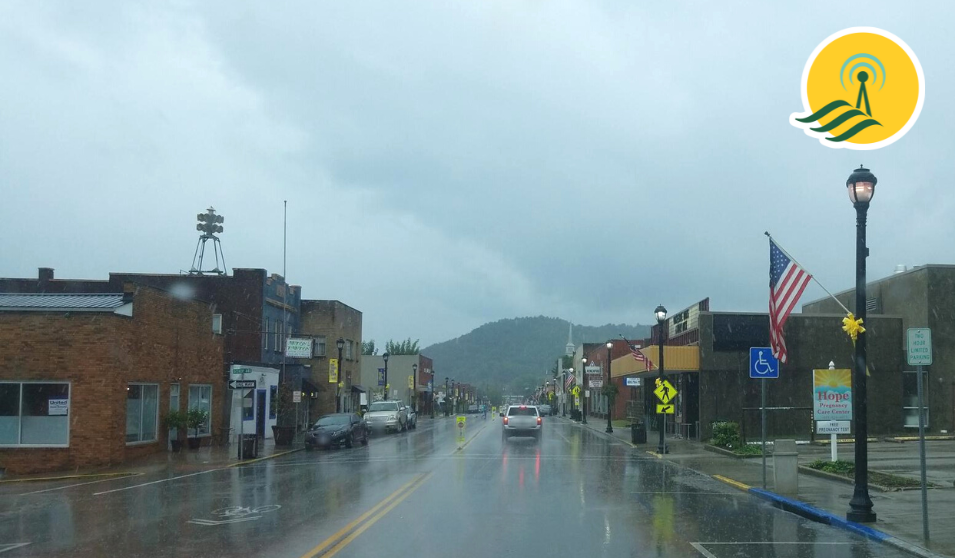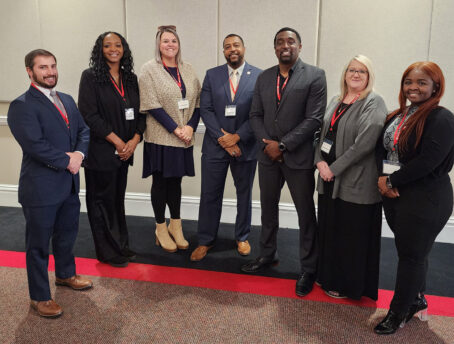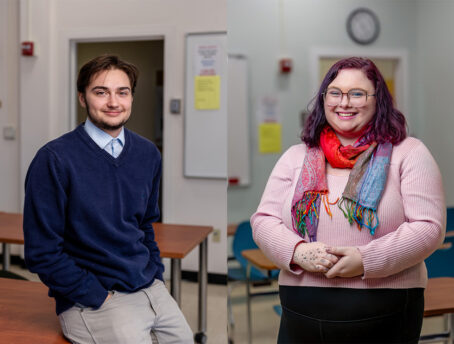Listen to the podcast here:
You can also find our podcast on Apple Podcasts, Stitcher, Google Podcasts and Spotify.
Written version:

Hello, and welcome to the I Am A Rural Teacher Podcast, a project of Rural Schools Collaborative. Many imagine rural communities as homogenous, non-diverse places, but in recent years especially quite the opposite is true. With rural populations diversifying in a variety of ways, it is critical now more than ever for teachers to be representatives and role models for the students they serve.
Shawntasia Butler is a third-year educator in Morehead, Kentucky, who believes that her identities as a special education teacher and as a black woman are solidly intertwined. We talked with Shawntasia about how she helps students value the ways that diverse rural communities celebrate their differences while bonding over what makes them the same.
I think I was always going to be a teacher, probably from middle school I was dead-set on being a teacher, but I thought I was going to be a math teacher. So then, when I was in high school I actually signed up to be a math peer tutor to test it out, like teaching math. Somehow something got rearranged and I ended up peer tutoring in a special needs classroom, and the teacher at my high school who was doing special needs was amazing. Every time I went in there, I was like, ‘Oh my gosh.’ It was nothing like I thought it was gonna be. Like everybody, you hear ‘special needs’ and you think it's one way, but it ended up being completely different. So after I peer tutored in high school, I ended up doing that for three years and I was like, ‘Okay, I'm gonna go into special education.'
Shawntasia teaches third-through-fifth-grade special education at Rodburn Elementary School, a calling she wouldn’t trade for the world. She is passionate about leaving a positive impact on the children she serves, but she admits that there are several difficulties on her chosen path.
There’s a teacher shortage, but there's definitely a SPED teacher shortage, and then being in a rural area…we were already getting the short end of the stick because nobody really wants to live in a small town, you know. A lot of people want that big city life. So we were already experiencing maybe a little shortage, or we weren't really getting the high quality teachers that you would if you lived in a city or if you lived in a more populated, more economically stable area. We have a national teacher shortage now, so I think rural special needs is really getting hit hard because there's no there's no one out there, and those people that do want to teach special needs, they're going to the big cities. They want those big bucks! So I think it is hard for us right now. We've got a lot of short ends of the sticks, but I wouldn't trade my small town kiddos for the world.
Shawntasia strongly believes that her experiences as a black woman help her to connect more deeply with her students because she is familiar with the feeling of being othered.
Doing those things that I do every day, like saying hi to everybody and being like, 'Oh, you have cute shoes' or 'Oh, I love that…' That just comes naturally to me. Special needs kids are more aware of differences, I would say. They're more aware that there's differences in people because we're special needs and we are kind of...I wouldn't say secluded, but we're more separate, so my group is already more aware that we're different. So me being with them, it's just natural for me to, once we leave the classroom, to be spreading my diversity everywhere! I don't know if that's natural for Gen Ed teachers, if they're minorities, to just be like, 'Okay, I need to be like this way. I need to let them know that we're the same even though we're different.'
As well, exposure to diverse populations and ways of life helps prepare students for the future ahead, especially as they venture outside of their rural communities:
I think a lot more teachers are aware of the divide, of the need for diversity, culturally appropriate books and lessons and stuff like that. I think a lot more teachers are becoming aware that when you teach things you should include minorities. Even if you don't have them in your classroom, it's really important for that exposure. So I think my school does a really good job of making everybody, no matter how different, feel very included.
It's important for them to see that although I am different, we are the same. We have similarities. That just makes it easier for them when they go out into the community or when they go to 45 minutes away to the mall, then it's not such a culture shock to see other minorities. If they see them they might be like, 'Oh, she's wearing blue, so maybe her favorite color is blue,' and they'll be more comfortable.
So, we are minorities, are underrepresented, but the little bit of us that are in rural areas are making a big difference. I don't feel like it's a chore or anything, but that might be me personally, that I just feel like it comes natural to sprinkle diversity everywhere.
In her view, diversity in leadership is important because diversity in students is inevitable. However, there is a sense of pressure, and a risk of feeling like the sole representative of a minority population, or standing for all diverse communities:
We are not very diverse. Our population is mostly white, Caucasian. There's a small Asian and African-American population, and so those two populations are very underrepresented. I think me being there kind of helps a little bit because people see me, they see that I'm African-American and I'm a woman, that I'm a teacher, and so the small portion of minorities that are there seem a little bit more comfortable just because they see someone who is different. So I would like to see more African-Americans in rural areas being teachers, showing their face, because even though the population is smaller, it does make a really big difference to have that one or two teachers that like look like you or that understand what it's like to be different.
Tons of people are like, 'You are the first black person I've met.' When I was in undergrad, it was just that their small towns didn't have black people, or they had that one black family that they've known their whole lives. There was not much diversity at all. So I guess it would be a lot of pressure, but again I just go with the flow. Wherever I flow, whatever I feel like I need to do at that moment to sprinkle diversity, then that's what I'm doing. I don't really feel any pressure about it.
Shawntasia explains that more diverse teachers would be a good start to easing this burden. However, she noted that teacher education programs are often not built with an inclusive mindset, which can act as an additional barrier to minority would-be teachers:
I'm probably that annoying kid that these people are like, 'What?' But I email and I'm like, 'Did you just - are these real answer choices? I'm sorry but I don't know how I feel about these answer choices,' or 'I don't know how I feel about these questions.' When we'd do discussion boards and stuff when I was in undergrad, or even in grad school, I would be like, 'Okay, as a black woman, I can tell you that this is a very odd question, and I'm not gonna lie, I don't really know how to answer this...did you ask this question because someone had said something weird?' Or 'Did you ask this question and you meant to ask it in a different way?' I've had to do that a lot in undergrad.
Or they're not used to minorities, so they're not used to a different way of thinking about diversity. So diversity courses got really awkward for me a lot of times. But I think it was really important for me in those courses to clarify that I was a black woman and this was my perspective, or that this that was how I felt about certain things, because I wanted them to know that maybe I felt like uncomfortable with the question or maybe I felt offended or maybe I felt like certain groups were not represented appropriately in certain projects or presentations and stuff like that.
I do feel like, as a minority, that when we are in certain courses as an educator, that it's very important for us to to point out that stuff because it might not be intentional that certain people were left out. It's just like the way things are for them, and they don't see anything wrong because they don't know different. So I think it is really important for us to point out stuff like that. Because we are minorities, we notice the differences. We notice every subgroup because we are a subgroup. So when you are a subgroup, you want to make sure that every subgroup is included. So I had to do that. I had to advocate for my subgroups! Which is a quality that makes me a great special needs teacher because you have to do a lot of advocating.
A lot of people teach diversity, but I do think I do think more minorities should teach diversity or do more trainings and stuff like that for people. It'd be, I think, a more universal outlook of what it's like, diversity, from a minority's perspective.
However, she finds strength in community with fellow young educators. As a member of the Rural Schools Collaborative’s Young Educators’ Advisory Council, she collaborates with a panel of several first-through-third-year teachers to discuss important matters facing rural educators right now, particularly those just starting out.
I love YEA! I really do. Every time we have a meeting...honestly, the meetings are late but I'm like, 'Oh, yes, I can't wait to talk to everyone! I can't wait to see what everyone's got going on, I can't wait to tell these people about my crazy couple months since the last time we talked.' We're all throwing ideas out there, throwing comments out there, and it's really nice to just talk to other people your age, people who relate to what you're going through, people who relate to your area, and then it's nice to see that you all want the same things. Like, you all want more people in your area, you all want your kids to have great teachers and great experiences even though our area is might not be economically advantaged, you know. We might be to the disadvantage compared to these other places, but what we lack in, maybe, financials, we make up for in spirit and heart and passion. So I love YEA, I do!
When asked what she wanted to leave listeners with, Shawntasia re-emphasized the importance of raising up the next generation of teachers and students with a diversity mindset:
Diversity! Honestly that's the one thing I think that I would reiterate, is making sure that when you teach, that you're including stories about multiple different cultures and multiple different people in multiple different groups. And I know that's very controversial for some people in some areas, but if we want our kids in small towns to stand a chance to survive in larger areas and to go out there and make a name for themselves and put a spotlight on where we are, then we need to give them the best education possible, and to do that we need to make sure that they understand diversity and that they are culturally aware - not only for them to be able to interact with other cultures and other minorities, but for themselves, so that when they do meet other people, they also have a sense of culture for themselves.
I would hate for my small town kiddos to get out there in the big city and to lose themselves because they didn't understand that in their small town, they actually were a culture, that they were a community. So it's very important that we do that, that we teach diversity and make sure that our kids are culturally aware, so that when they do go out there and they do big things like become the president, or the Secretary of State, or the mayor, that they understand that people are all the same even though we're different, that they understand who they are and where they fit in into this world, and that they do matter and they can make a difference. But to do that, they need to understand diversity and be culturally aware.
Thank you for listening to this episode of the I Am A Rural Teacher Podcast. We’d like to thank our partners at Morehead State University and the National Rural Education Association for collaborating with us on this episode. Special thanks to Shawntasia for sharing her story, being a role model for her students, and serving on the Young Educators’ Advisory Council. The I Am A Rural Teacher Project is made possible by a grant from the Bill & Melinda Gates Foundation.




